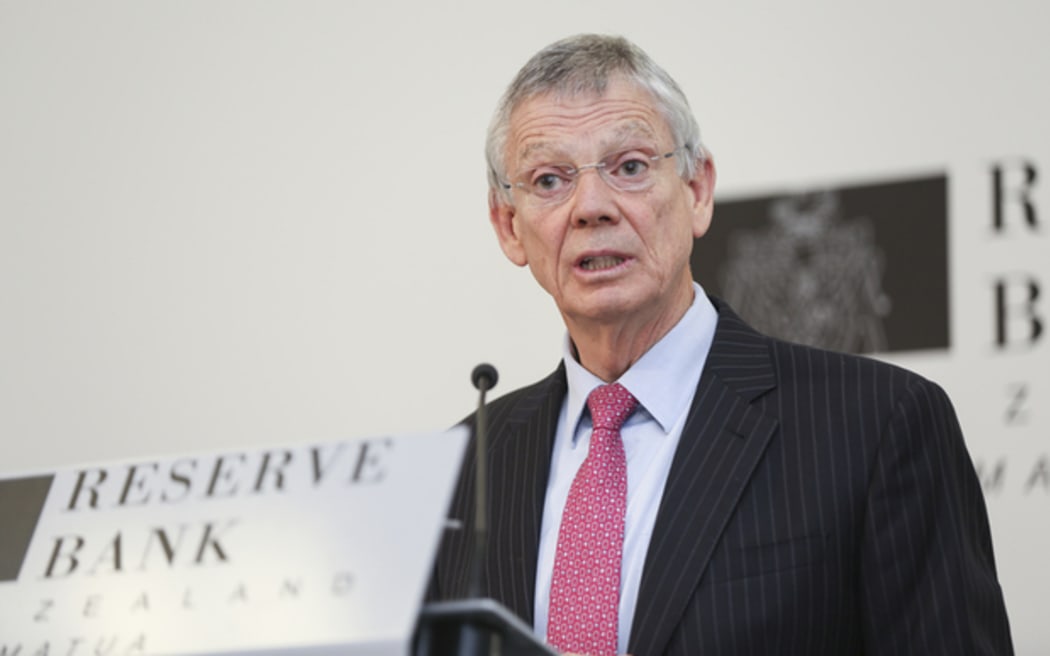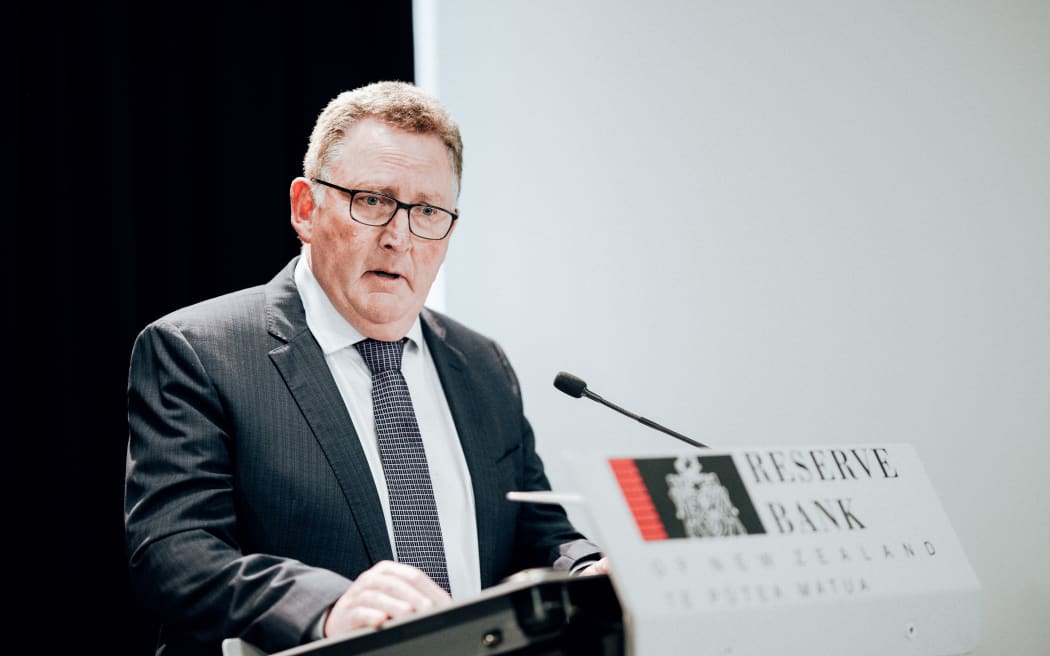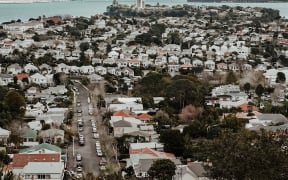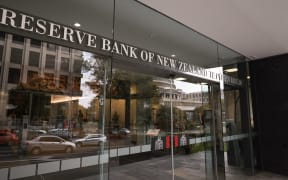The Reserve Bank (RBNZ) and other central banks of developed economies have been lambasted in a report by the free market think tank, the New Zealand Initiative.

Former RBNZ governor Graeme Wheeler. File photo. Photo: RNZ
Former RBNZ Governor Graeme Wheeler has co-authored the report which roundly criticises central banks around the world for serious mistakes in monetary policy during the pandemic which allowed inflation to get out of the control and hit multi-decade highs.
The paper concludes that central banks were too confident about their monetary policy frameworks, their economic models, and lost their focus on keeping inflation in check.
It also said central banks with dual mandates - to control inflation and also maximise employment - had conflicts in trying to balance between the two, while they were also distracted by such issues as climate change.
Wheeler, who headed the RBNZ between 2012 and 2017, said central banks had become complacent and over estimated their ability to keep inflation under control when they were also pumping billions into economies through emergency measures such as bond buying, known as quantitative easing, at a time when interest rates were already low.
"So why are the central banks injecting so much liquidity into the economy? To me it was just bound to come out not only in house price inflation, but also product inflation," he said in an NZ Initiative podcast on the report.
The paper said central banks were too slow to turn off monetary stimulus, and then forced to rush large interest rate rises, which would mean significant losses on the assets they bought, such as bonds.
It said they also wrongly believed the low inflation of the mid-2010s caused by supply side factors such a cheap oil and technology advances would persist.

Reserve Bank of New Zealand Governor Adrian Orr. File photo. Photo:
The current RBNZ Governor, Adrian Orr, has previously said the bank had pursued a "least regrets" policy of supporting the economy during the pandemic and that it was better to do too much rather than too little.
However, the research paper dismissed such an approach.
"Some central bankers have said that there was no alternative and have no regrets at the outcome in terms of explosive house prices and rapidly rising consumer price inflation.
"They are wrong on the first point and should have major regrets on the second."
The Reserve Bank said in a brief statement that it was made aware of the report late on Monday afternoon and it had no comment to make.
"We are currently carrying out our statutory five-yearly review of monetary policy and we have encouraged the public to make submissions on this remit review," the statement said.
The RBNZ ended its bond buying last July and started raising its official cash rate in October, which has gone from 0.25 percent to the current 2.5 percent, with expectations it will raise another half a percentage point next month.
Wheeler oversaw the introduction of the loan to value ratios (LVR) in 2013 to control an overheating housing market, but conceded it was a mistake during his term to raise the OCR three times in 2014 when they saw signs of rising domestic inflation only to quickly undo the rate rises in 2015.
Economic commentators and former bank officials have become increasingly critical around the world about the decisions taken to counter the pandemic, which fuelled house prices and share markets, and their slowness to tackle surging inflation.
Banks must analyse mistakes - Wilkinson
Central banks' policy mistakes had left them in a bind, and they need to analyse what went wrong, co-author Bryce Wilkinson, senior research fellow at The New Zealand Initiative, said.
"To get inflation down the central banks have to convince investors workers employers that inflation's going to be got down low again and kept down low, so raising interest rates is the central means of doing that, but they've got to ... signal their determination in a credible way.
"Our report's arguing that they can start to achieve credibility by analysing the mistakes that have been made to get us into this situation and then explaining what they're going to do to address them and make sure it doesn't happen again."
"Early in 2020 when Covid was first striking and there were lockdowns there was some need to assist governments but the central banks have pumped the global capital markets with money to an unprecedented degree and they've been much too slow to pull back on that," Wilkinson told Morning Report.
"They didn't forecast the inflation which has currently broken out and when it did break out they first said it was temporary.
"Now they're more in a backs-to-the-wall situation where expectations have got away on them and the more they raise interest rates the more they risk precipitating recession.
"So they're in a bind, and that's a mess."
The report argues that the banks took their eye off their core responsibilities in focusing on issues such as climate change and inequality, and in the RBNZ case also adopting a Māori world view in the operations of the central bank.
The problem with that was the bank was not doing its core job well enough, Wilkinson said, and was getting involved in things were "essentially peripheral to the prime goal of price stability".
"What people need from central banks is that they don't let inflation blow out.
"These other things are distractions."
Nats seeking inquiry
The National Party is demanding an independent inquiry into the Reserve Bank's pandemic response - and to what extent it is to blame for sky-high inflation.
Finance spokesperson Nicola Willis said she respected the bank's independence, but it was important to evaluate its decisions.
"We think an independent assessment of the performance of the reserve Bank and its monetary policy decision is warranted and we think that assessment should be brought to bear on the appointment process," she said.
"Now, we think the government has nothing to fear from an independent assessment of monetary policy decisions over the past two years. In fact it owes that to New Zealanders who are now suffering under a cost of living crisis that's unprecedented."
She said the inquiry should look into whether interest rates were kept low for too long, whether Large-scale asset purchases, the funding-for-lending programme, and low interest rates were overstimulatory to the economy when combined with increased government spending.
"What role did Grant Robertson play in signing off, for example, that LSAT programme, and was there proper coordination between the Reserve Bank and the government - both of whom were pumping the money hose at the same time."
"If they say no to that inquiry, then it's up to them to assure New Zealanders that some sort of independent assessment has taken place of the Reserve Bank's performance."
National Partu leader Christopher Luxon said the party wanted the inquiry they were proposing to be completed before the next Reserve Bank governor's appointment.
Minister of Finance Grant Robertson said he backed the Reserve Bank in the face of criticism.
He said he still had confidence in the Bank and its governor, and the criticisms of the bank were an attempt to rewrite history.
"Covid-19 was a unique situation for both fiscal and monetary policy, I think that there is a tremendous amount of hindsight economics taking place at the moment where people are trying to rewrite history about that period of time," he said.
"The second thing I would say is that the criticism of central banks around the world does somewhat betray the fact that everybody had to deal with a very difficult situation."
"But obviously everybody will have their views about looking back in history rather than being there at the time."






